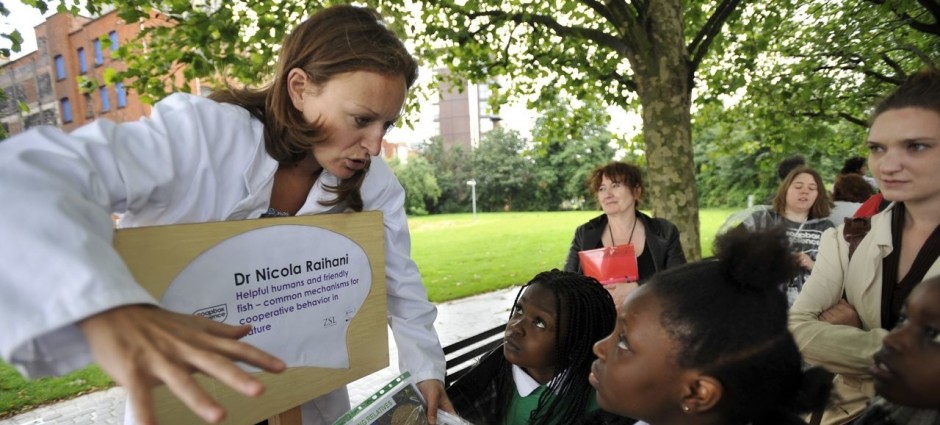 Dr Tracy Kivell is a palaeoanthropologist from the University of Kent. Her research focuses on extant and fossil apes, to further our understanding of the origin of human hand use throughout our evolutionary history. Here she talks about her background and what inspired her to get into science. You can catch Tracy on her soapbox on the 27th of May in London, where she’ll give a talk called: “Well, that’s handy! Evolution of our hands and our dexterity”
Dr Tracy Kivell is a palaeoanthropologist from the University of Kent. Her research focuses on extant and fossil apes, to further our understanding of the origin of human hand use throughout our evolutionary history. Here she talks about her background and what inspired her to get into science. You can catch Tracy on her soapbox on the 27th of May in London, where she’ll give a talk called: “Well, that’s handy! Evolution of our hands and our dexterity”
SS: How did you get to your current position?
TK: I am now a palaeoanthropologist and as a kid always liked rocks, fossils and anything old, but I actually started off doing a degree in Fine Arts. I quickly realised, however, that I didn’t enjoy having other people tell me how to draw or paint. I then moved to classical archaeology, but found that wasn’t quite old enough. I took an Introduction to Anthropology course and distinctly remember seeing casts of fossil human skulls for the first time that I found fascinating. But I wasn’t quite ready to fully commit to a degree or university in general, so dropped out and took a couple years off to work and travel. I returned to academia to do a BSc degree in Biological Anthropology at the University of Toronto … and continued with an MA and PhD as well. I got my first postdoctoral position at Duke University (accepting the position after grossly underestimating how much of my PhD dissertation I still had to finish!), teaching human anatomy for two years. I applied for a lot of grants and permanent academic positions that I didn’t get. I turned down a tenure-track offer at a university in my home country (Canada) to do more research as a postdoc at the Max Planck Institute for Evolutionary Anthropology in Leipzig, Germany. I spent nearly four years there, in awe of the world-leading scientists within the institute and taking advantage of the amazing research opportunities, as well as enjoying the experience of living in a new country and culture. When my partner took a permanent position in the UK, I tried to create a position for myself by applying for ERC Starting Grant. After submitting the grant, I got fixed-term appointment at the University of Kent, and then found out that my ERC grant was successful. I turned my fixed-term appointment into a permanent one and have been at Kent ever since. So a rather circuitous route, with a good dose of luck thrown in, but I’m very happy I turned down that tempting tenure-track position in the end.
SS: What, or who, inspired you to get a career in science?
TK: My parents, who have always been supportive of everything I do. And my grade 9 English teacher, Ms. Platt, who, in addition to being an excellent English teacher, told us stories about the Franklin Expedition that explored the Arctic in the mid-1800s. She told us about the graves that had been found and everything that could be learned from the skeletons and what happened to the expedition. I found it captivating.
SS: What is the most fascinating aspect of your research/work?
TK: The fossils. Holding a newly-discovered fossil in my hand or looking inside a fossil (via microCT imaging) and knowing that I am one of the first very lucky humans to see it in 2 or 3 million years. And then trying to figure out what that fossil can tell us about behaviour and our own evolutionary history.
SS: What attracted you to Soapbox Science in the first place?
TK: Promoting women in science and promoting public engagement in science. We need more of both in the world today.
SS: Sum up in one word your expectations for the day
TK: Nervous!
SS: If you could change one thing about the scientific culture right now, what would it be?
TK: Gender bias, in everything from young girls being told (implicitly or explicitly) they are not clever enough to be scientists, to successful women academics facing poorer teaching reviews, poorer citation indices, lower pay… often topped off with sexual harassment ….simply because they are women.
SS: What would be your top recommendation to a woman studying for a PhD and considering pursuing a career in academia?
TK: Love what you do, work hard, be confident in your abilities (and feeling like an “imposter” makes you a better scientist), ask questions, find a good mentor and learn from them, protect your research time and work efficiently, do as many postdocs as you can and use them to learn new skills, don’t be afraid to take an unusual job, don’t be afraid to turn down a job, collaborate, have fun!
